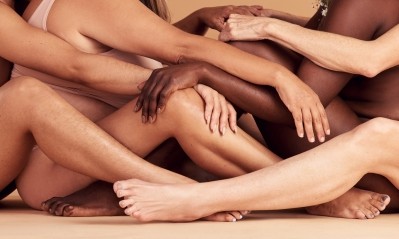Beauty has ‘crucial role’ to play in shifting menopause stereotypes
![Brands and retailers can diversify imagery around the menopause - depicting more women of colour, different body types and queer and non-binary people, says a media expert [Getty Images]](/var/wrbm_gb_food_pharma/storage/images/_aliases/wrbm_large/publications/cosmetics/cosmeticsdesign-europe.com/article/2023/02/23/menopause-beauty-can-help-shift-media-stereotypes-and-create-more-inclusive-category-says-expert/16193494-1-eng-GB/Menopause-beauty-can-help-shift-media-stereotypes-and-create-more-inclusive-category-says-expert.jpg)
Writing in the Journal of Aging Studies, Deborah Jermyn PhD, reader in film studies at the UK’s University of Roehampton and specialised in women, feminism and ageing in the media, analysed the rise of menopause awareness in the UK. Examining how this intertwined with contemporary celebrity culture and media, findings showed a ‘menopausal turn’ across the country amidst heightened awareness and conversation on the topic.
Menopause in the media and cultural spaces
“In recent years, the UK has witnessed an unprecedented period of pronounced public cultural conversation and promotion around a newly inflected era of menopause awareness,” Jermyn wrote. And this had been seen across multiple and intertwined cultural spaces, she said, from education, politics and medicine, to retail, publishing and journalism.
As awareness continued, however, she said there remained a clear need for greater menopause support for women. “One of the most commonplace resentments voiced in the media by both celebrity and ‘civilian’ commentators within the menopausal turn is frustration and dismay at the absence of available guidance and information when they entered perimenopause, and didn’t understand what this might entail,” Jermyn wrote.
Importantly, she said future guidance and support had to be offered with greater inclusivity, because today’s discourse around menopause remained “white and privileged”.
“Understanding of menopause is being envisioned and bolstered through this prism as primarily the terrain of white, cisgendered, middle-class affluence – even aspiration at times”, the media expert said – a movement that had to be “identified and acted on by all those involved in studying or shaping menopause in the media”.
So, what did all this mean for beauty brands and retailers, particularly those with a focus on the menopause category? And could industry participate in shifting the dial on representation and inclusivity in this space?
‘We definitely need to see more inclusive approaches’
“Crucial to how this marketplace develops is awareness of and sensitivity to the fact that the ‘users’ here are diverse,” Jermyn told CosmeticsDesign-Europe.
Every woman experienced menopause differently, she said, and it was also clear there were no “universal ideas” in their approaches to it.
“So, we definitely need to see more inclusive approaches and representations. It’s increasingly recognised now how the established popular imagery around menopause was for so long very problematically one-dimensional – being basically an older white woman, maybe with greying hair, looking tense or dejected.”
She said the beauty industry clearly had a “crucial role to play in moving that on”.
“It’s one thing to recognise this, however, and another to actually replace this with a genuinely more expansive repertoire of menopausal people, including, for example, more women of colour, more body types, and queer and non-binary people.”
Beyond imagery, there was also opportunity for industry to shift the narrative, Jermyn said, away from the “traditionally entrenched negative ideas” of menopause being a period marked by loss.
Caution – beauty must avoid ‘jumping on the bandwagon’
However, she said as the market continued to grow and more companies looked to target menopausal consumers, it would be important to do so responsibly – a sentiment previously addressed during CosmeticsDesign-Europe’s Menopause Beauty webinar last year.
“There is an obvious risk that the market grows in a way which seeks to capitalise on women’s perceived vulnerabilities in this period, and that this becomes another arena in which women are subjected to pressure to buy multiple products, in order to have a ‘good’ menopause.”
Many women, however, were “savvy and resistant to this pressure”, she said, so beauty brands would do well to realise that as they framed products and campaigns.
“This isn’t to say these consumers don’t want to or won’t buy menopause-centred beauty. Of course, some of those with the means to do so will be open to this. Rather they would often welcome an address which doesn’t feel like brands merely jumping on a bandwagon as public discourse around menopause continues to grow.”
Future fears amidst a wider menopause ‘movement’
Adding a final thought, Jermyn said: “There is some concern that while at one level it seems we are witnessing a positive cultural shift, because it’s really encouraging to see more people talking openly about menopause, there’s a danger this could become counterproductive for women.
“The fear here is that this movement will be weaponised against them. For example, the more discussion there is of the physical and psychological challenges some women face in menopause, the more they may be undermined in the workplace. Again, then, the industry is going to be central to how this discussion takes shape,” she said.
Source: Journal of Aging Studies
Published online ahead of print, doi: 10.1016/j.jaging.2023.101114
Title: “’Everything you need to embrace the change’: The ‘menopausal turn’ in contemporary UK culture”
Author: D. Jermyn

![The beauty industry has a duty of care to fulfil, empowering consumers of all ages to feel skin and body confidence [Getty Images]](/var/wrbm_gb_food_pharma/storage/images/_aliases/wrbm_medium/publications/cosmetics/cosmeticsdesign-europe.com/article/2023/04/21/beauty-ageing-ideals-must-change-and-brands-have-a-duty-to-drive-this-says-facegym-founder/16355744-1-eng-GB/Beauty-ageing-ideals-must-change-and-brands-have-a-duty-to-drive-this-says-FaceGym-founder.jpg)
![A market like India offers great growth promise in health and wellness, for example, as per capita income continues to surge [Getty Images]](/var/wrbm_gb_food_pharma/storage/images/_aliases/wrbm_medium/publications/cosmetics/cosmeticsdesign-europe.com/headlines/business-financial/beauty-health-and-wellness-growth-promise-in-emerging-markets-like-india-china-middle-east-and-africa-says-globaldata/16347586-1-eng-GB/Beauty-health-and-wellness-growth-promise-in-emerging-markets-like-India-China-Middle-East-and-Africa-says-GlobalData.jpg)
![Freshness and vibrant tropicals inspired from the great outdoors are key colour themes to tap into under the wider umbrella of 'peace' as beauty's most important trend in 2023 [Getty Images]](/var/wrbm_gb_food_pharma/storage/images/_aliases/wrbm_medium/publications/cosmetics/cosmeticsdesign-europe.com/article/2023/04/13/nellyrodi-beautylab-and-color-intelligence-2023-reports-say-peace-is-key-theme-for-colours-textures-and-innovation/16331929-1-eng-GB/NellyRodi-BeautyLab-and-Color-Intelligence-2023-reports-say-peace-is-key-theme-for-colours-textures-and-innovation.jpg)


















